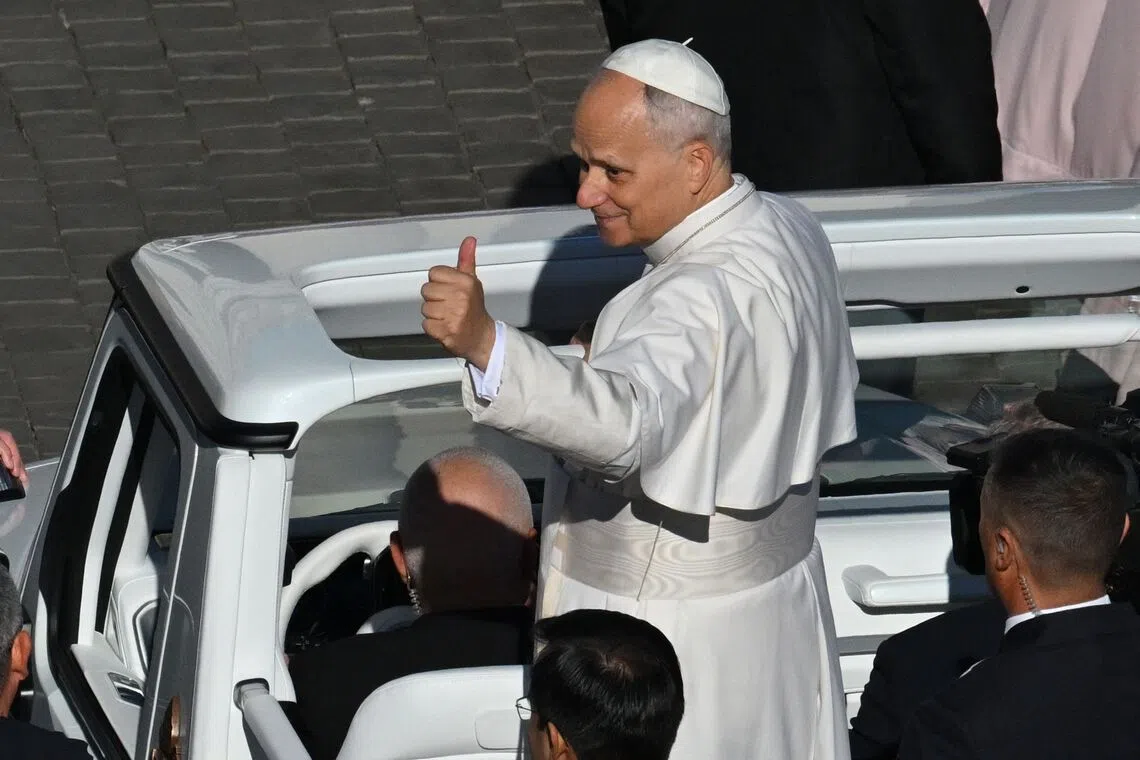Turkey’s Christians battle inequality, exclusion
Sign up now: Get ST's newsletters delivered to your inbox

During his trip, Pope Leo will promote Christian unity and urge peace efforts amid heightened tensions in the Middle East.
PHOTO: AFP
ANKARA – Despite some progress in restoring their rights, Christians in Turkey are still struggling against inequality and a sense of exclusion as Pope Leo XIV visits the country this week.
“In Turkey, 99 per cent of the population is Muslim,” President Recep Tayyip Erdogan often likes to say of his officially secular Muslim-majority nation of 86 million people.
“Every time he says that, I feel excluded because he always fails to mention the non-Muslim majorities,” said Mr Yuhanna Aktas, president of the Assyrian Union, which represents Assyrian Christians in south-eastern Turkey.
“We are not seen as full citizens.”
Historians say there are around 100,000 Christians in Turkey today, compared with nearly four million at the start of the 20th century, with the numbers falling significantly due to forced exile or massacres as the Ottoman Empire crumbled, and modern Turkey emerged.
When Pope Leo visits, he will meet local Christian leaders at Istanbul’s Assyrian Orthodox Mor Ephrem church, which was inaugurated just two years ago.
Although the land was granted by the state, it is the only new church built in Turkey since it became a republic in 1923.
Christian minorities have also struggled to achieve representation, with many civil service positions closed to them despite no legal ban on non-Muslim minorities holding office.
“The only non-Muslim senior official in Turkey today is a local administrator from the Armenian community,” said Mr Yetvart Danzikyan, editor-in-chief of the Armenian weekly Agos.
“This lone example sums up the civil rights situation.”
‘The enemies inside’
For decades after Turkey became a republic, Christians and Jews were regularly described by certain government officials and media outlets as “the enemies inside” and were targeted by discrimination and violence – even into the early 2000s.
And the word “Armenian” is still today sometimes used as an insult.
In its 2024 report on Turkey, the London-based Minority Rights Group said “non-Muslims were constantly discriminated against because the promoters of Turkish nationalism considered them incapable of becoming Turks due to their religious identity”.
Mr Laki Vingas, founder of a Greek community support group called Rumvader, said the government had been attempting to address that.
“For 20 years, both the state and ourselves have been striving to fix the injustices of the past. This process is not yet complete, but at least we have no difficulty meeting with the authorities,” he told AFP.
At the same time, certain unnerving events have left the community on edge, such as the growing shift towards conservative nationalism under Erdogan’s Islamic-rooted government, Mr Danzikyan said.
There has been violence: Armenian journalist Hrant Dink was shot dead in Istanbul in 2007, and four years later, a young Armenian was murdered while doing his military service.
In 2020, Armenians faced threats during the Nagorno-Karabakh war, and in 2024, two gunmen burst into a Catholic church in Istanbul, killing one person and injuring another.
Violence
Another unsettling development was the controversial decision to convert Istanbul’s iconic 4th-century Hagia Sophia basilica from museum to mosque in 2020, said Mr Danzikyan.
“At the same time, there’s talk about reopening the Greek Orthodox seminary,” he said of an Istanbul theological college closed in 1971, depriving the church of its only facility for training clergy in Turkey.
Blocked for years, the matter was raised by Ecumenical Patriarch Bartholomew at the White House in September, with US President Donald Trump pledging his help, raising hopes it could soon be reopened.
Observers also say society has progressively opened up over the past 20 years, with Turkish civil society more willing to commemorate the Armenian genocide – a term firmly rejected by Ankara – despite a ban on such gatherings in public spaces.
“More and more people are asking questions instead of holding onto their prejudices,” Mr Vingas said, hailing the emergence of “a much more open society, mainly in Istanbul” where most of Turkey’s Christians live. AFP


